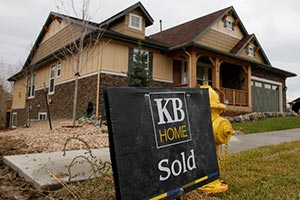Housing Market Turnover to Improve Over Coming Year, Poll Shows

Turnover in the U.S. residential property market is set to rise over the coming year, according to a strong majority of analysts polled by Reuters who also forecast the pace of house price gains to remain relatively steady this year and next.
The results, from a poll taken Aug. 15 to Aug. 30, are based on optimism about a continued strong job market and spell good news for the U.S. economy given all of the industries tied to housing, from construction to furniture sales.
House prices are forecast to rise at more than double the rate of inflation this year, by 5.2%, followed by 4.6% next year, according to the poll, roughly similar to findings from a Reuters survey three months ago.
The data coincide with increased optimism from Federal Reserve officials that the case for another interest rate rise is getting stronger, a view that could be bolstered by expected strong August hiring data due later this week.
"The tighter U.S. labor market will lead to stronger wage income growth over the coming year. Combined with still-low mortgage rates, income growth will lead to stronger purchase demand," said Andres Carbacho-Burgos, analyst at Moody's Analytics in West Chester, Pennsylvania.
With the Fed likely to raise rates only gradually, 30-year mortgage rates are not expected to rise much, either, according to the poll. Currently at 3.67%, they are expected to climb to 4.08% next year and 4.60% in 2018.
The recovery from the housing market collapse that began nearly a decade ago, knocking prices down by 40% in some areas and triggering a global financial crisis, has been relatively swift in recent years. It has been driven in part by institutional investors as well as existing owners.
That has left the housing market overall, which still varies greatly across the country, rated a median of 6 on an affordability scale ranging from 1 as cheap and 10 as most expensive, according to the poll.
Many young aspiring first-time buyers, who are frequently burdened by exceptionally high piles of student debt, remain priced out of the market, left behind by existing homeowners and speculators.
But many said that with the job market improving and pay for younger people eventually rising, it is only a matter of time before the young begin supporting the market again and bring home ownership up from multigenerational lows.
"More millennials will become first-time buyers," wrote BMO Capital Markets senior economist Sal Guatieri in Toronto. "Twenty-five-year-olds are the single largest population group, and they will be of prime home buying age early next decade."
But no analyst polled expected a surge in U.S. home prices like those in Canada, which did not have a major market correction and where prices are forecast in a similar poll to rise an average 10% this year.
Still, more than two-thirds of economists who answered an extra question thought housing turnover would rise in the coming year, with only a handful saying it would fall.
In the meantime, existing home sales are forecast to run at a 5.55 million annualized unit rate over the coming several quarters, slightly higher than the 5.39 million unit rate reported for July.
"Continued equity build-up will allow some homeowners who have been waiting to sell to list their homes. Additionally, growth in the new home market will free up resale inventory," wrote Matthew Gardner, economist at Windermere Real Estate Company in Seattle. "That said, I do not expect to see any tangible expansion of inventory until we get into 2017."


